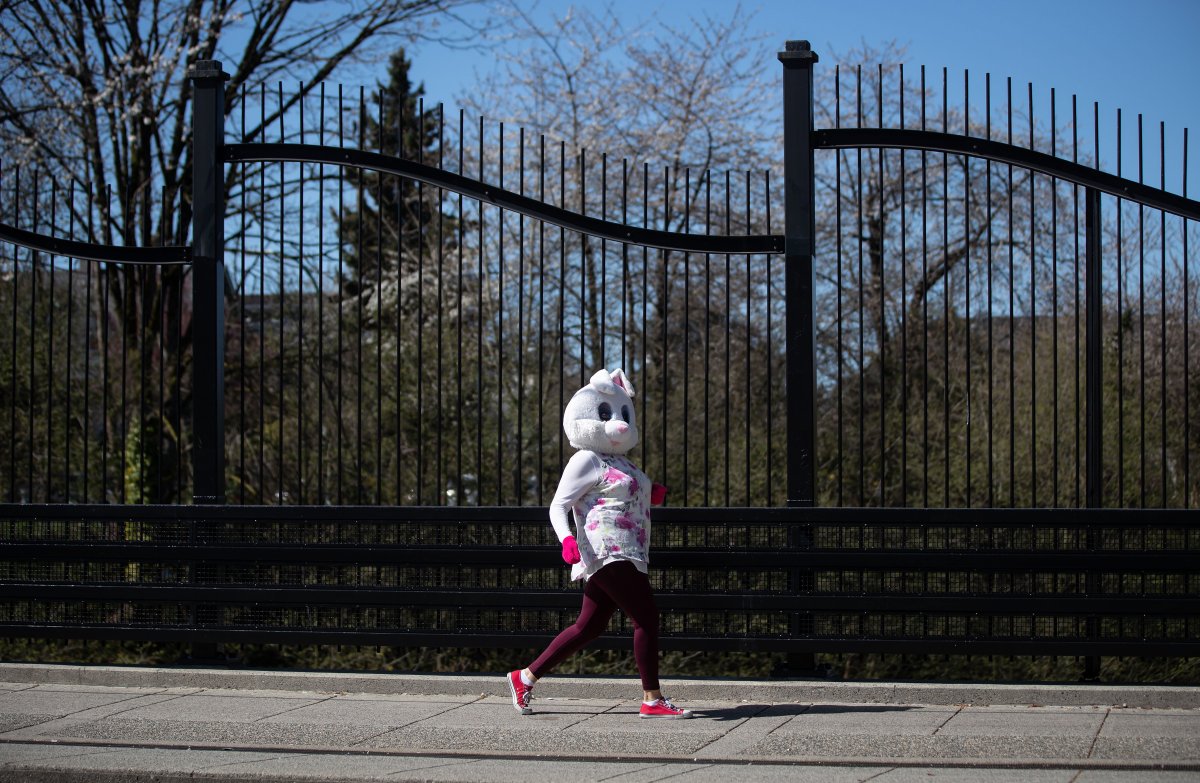The home page of British Columbia’s main tourism website still features the province’s classic catchphrase to attract visitors: “Super, Natural British Columbia.”

But right under that is a new message: “Explore BC… Later.”
Like provincial governments across the country, Premier John Horgan’s B.C. government is urging people to avoid all non-essential travel, including within B.C.’s own borders.
But that’s easier said than done in a province of stunning natural beauty, where people love to get outside and explore.
READ MORE: Coronavirus tracker — total number of confirmed cases by region
The lure of the outdoors was particularly strong on a warm Easter long weekend that had some B.C. tourist towns unhappy with the tourists.
“There are some people still not getting the message,” said Peter Luckham, chair of municipal trustees for the province’s picturesque Gulf Islands.
“We need to do strong messaging,” Luckham told me. “People must realize the impacts they might be potentially making in these small, vulnerable communities.”
Those impacts include a drain on local food supplies and the risk of a virus outbreak in remote communities with limited health services, he said.
Despite that, B.C. tourist towns reported a modest influx of holiday visitors over the weekend, stoking fears of even larger waves of travellers as the weather gets nicer.

Tahirih Rockafella has her finger on the pulse of Galiano Island, where she’s not only an elected trustee but also a volunteer firefighter and operator of a small supermarket.

Get daily National news
“In the grocery store, my staff were upset,” she said about off-island visitors stocking up on weekend supplies.
“We have a local health-care clinic that’s staffed part-time,” she said.
“We have one ambulance and a handful of volunteer firefighters. If someone is in severe medical distress, they would have to be medevaced off the island and flown to Vancouver by helicopter.
“On a good day, that might take an hour and a half. On a bad day, with low clouds or high winds, it could be six hours.”
It’s a powerful argument for restless British Columbians to stay home. And it’s one being voiced by small towns all around the province.
Despite that, B.C. is one of a dwindling number of provinces that have not imposed internal travel restrictions enforced by checkpoints.
Eight provinces and territories have now brought in border checkpoints and travel lockdowns, including police-enforced checkpoints in Quebec.
Now, some B.C. communities are taking matters into their own hands.
Just outside postcard-pretty Tofino, famous for its spectacular beaches and wild West Coast surfing, the town set up its own checkpoint to discourage visitors.
“We’re urging visitors to please stay home and not come to the West Coast,” said Tofino Mayor Josie Osborne.
The checkpoint, operated by park rangers and the local RCMP detachment, stopped vehicles and asked visitors to turn around, which they did.
Now, other B.C. political leaders want a wider system of checkpoints and domestic travel restrictions.
“People need to respect the fact that there are huge sacrifices being made right now,” said Paul Manly, a Green Party MP from Vancouver Island who wants a tougher crackdown on non-essential travel aboard the province’s sprawling system of car ferries.
“There was lots of chatter on social media about the ferries filling up with people with kayaks on top of their cars, people heading over to the island to get a break from the city.
“There’s just no need for non-essential travel right now.”
READ MORE: Coronavirus — Should Canada restrict travel between provinces, territories?
But travel restrictions could be tough to enforce in a province with the most active, outdoor-oriented population in the country. Even the B.C. government’s move to shut down its network of provincial parks was met with an immediate backlash from hikers and campers who argued the move was overkill.
“We like to think people are responsible and can keep physically distancing in a park,” said Louise Pedersen of the Outdoor Recreation Council of B.C.
“We’re hoping there are some ways we can open some parks again.”
And if the provincial parks remain closed, there are always the province’s network of recreation sites and hiking trails, which are generally remote, accessed by gravel logging roads and remain open, at least for now.
As the weather warms up, British Columbians will be itching to get outside. If the province’s virus caseload remains under control, it may be tough to keep everybody indoors.
Mike Smyth is host of ‘The Mike Smyth Show’ on Global News Radio 980 CKNW in Vancouver and a commentator for Global News. You can reach him at mike@cknw.com and follow him on Twitter at @MikeSmythNews.












Comments